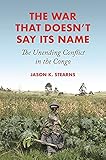The War That Doesn't Say Its Name : The Unending Conflict in the Congo / Jason K. Stearns.
Material type: TextPublisher: Princeton, NJ : Princeton University Press, [2022]Copyright date: ©2021Description: 1 online resource (328 p.) : 14 b/w illus. 5 tablesContent type:
TextPublisher: Princeton, NJ : Princeton University Press, [2022]Copyright date: ©2021Description: 1 online resource (328 p.) : 14 b/w illus. 5 tablesContent type: - 9780691224527
- POLITICAL SCIENCE / World / African
- Ambiguity
- Anti-imperialism
- Apathy
- Armed Forces of the Democratic Republic of the Congo
- Assassination
- Banyarwanda
- Belligerent
- Bourgeoisie
- Bunia
- Bureaucracy
- Cannibalism
- Carl von Clausewitz
- Censure
- Code name
- Colombian conflict
- Combat
- Combatant
- Communal violence
- Conditionality
- Conflict resolution
- Corruption
- Counter-insurgency
- Cynicism (contemporary)
- Defeatism
- Defection
- Demobilization
- Desertion
- Dissident
- Distrust
- Ebb and flow
- Electoral fraud
- Ethnic conflict
- Famine
- First Congo War
- Foreign Correspondent (TV series)
- Gisenyi
- Governance
- Headline
- Henry Morton Stanley
- Hewlett-Packard
- Hostility
- Humanitarian crisis
- Hutu
- Immorality
- Impunity
- Information asymmetry
- Insubordination
- Insurgency
- Internally displaced person
- Intimidation
- Ituri conflict
- Joseph Kabila
- Kigali
- Kinshasa
- M23 rebellion
- Mai-Mai
- Military academy
- Military operation
- Military organization
- Mixed brigade
- Mobutu Sese Seko
- Mongbwalu
- National Congress for the Defence of the People
- National Resistance Army
- National security
- North Kivu
- Paganism
- Paul Kagame
- Persecution
- Politician
- Politics
- Precedent
- Protest
- Provisional government
- Proxy war
- Raia Mutomboki
- Rebel Alliance
- Rebellion
- Refugee camp
- Refugee
- Reginald Scot
- Resentment
- Resignation
- Rwanda
- Second Congo War
- Self-defense
- Skepticism
- Smuggling
- Sri Lankan Civil War
- The Guns of Navarone (novel)
- Too big to fail
- Tutsi
- Uganda People's Defence Force
- Uganda
- Unclean spirit
- Unrest
- Violence
- War crime
- War economy
- War
- 967.51034 23
- online - DeGruyter
| Item type | Current library | Call number | URL | Status | Notes | Barcode | |
|---|---|---|---|---|---|---|---|
 eBook
eBook
|
Biblioteca "Angelicum" Pont. Univ. S.Tommaso d'Aquino Nuvola online | online - DeGruyter (Browse shelf(Opens below)) | Online access | Not for loan (Accesso limitato) | Accesso per gli utenti autorizzati / Access for authorized users | (dgr)9780691224527 |
Frontmatter -- Contents -- 1. Introduction -- 2. The Historical Background -- 3. Explaining the Congolese Conflict -- 4. The Role of the Congolese and Rwandan States -- 5. The Theory: Involution, Fragmentation, and a Military Bourgeoisie -- 6. The CNDP and the M23 -- 7. The Raia Mutomboki -- 8. Ituri and the UPC -- 9. Peacemaking and the Congo -- Acknowledgments -- Notes -- Bibliography -- Index -- A note on the Type
restricted access online access with authorization star
http://purl.org/coar/access_right/c_16ec
An in-depth look at the Congolese conflict post-2003 and why the violence hasn’t ended despite international interventionWell into its third decade, the military conflict in the Democratic Republic of the Congo has been dubbed a “forever war”—a perpetual cycle of war, civil unrest, and local feuds over power and identity. Millions have died in one of the worst humanitarian calamities of our time. The War That Doesn’t Say Its Name investigates the most recent phase of this conflict, asking why the peace deal of 2003—accompanied by the largest United Nations peacekeeping mission in the world and tens of billions in international aid—has failed to stop the violence. Jason Stearns argues that the fighting has become an end in itself, carried forward in substantial part through the apathy and complicity of local and international actors.Stearns shows that regardless of the suffering, there has emerged a narrow military bourgeoisie of commanders and politicians for whom the conflict is a source of survival, dignity, and profit. Foreign donors provide food and urgent health care for millions, preventing the Congolese state from collapsing, but this involvement has not yielded transformational change. Stearns gives a detailed historical account of this period, focusing on the main players—Congolese and Rwandan states and the main armed groups. He extrapolates from these dynamics to other conflicts across Africa and presents a theory of conflict that highlights the interests of the belligerents and the social structures from which they arise.Exploring how violence in the Congo has become preoccupied with its own reproduction, The War That Doesn't Say Its Name sheds light on why certain military feuds persist without resolution.
Mode of access: Internet via World Wide Web.
In English.
Description based on online resource; title from PDF title page (publisher's Web site, viewed 29. Mai 2023)


